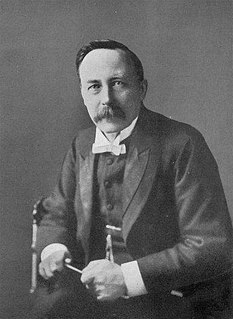A Quote by Catherine Booth
If you are under the dominion of sin, you are yet an utter stranger to the salvation of God.
Related Quotes
There are actually only ever two pastoral problems you will ever encounter. The first is this: persuading those who are under the dominion of sin that they are under the dominion of sin. That's the task of evangelism. And [second], persuading those who are no longer under the dominion of sin that they are no longer under the dominion of sin because they're Christ's.
I take leave to contradict those who say that salvation is an evolution! All that ever can be evolved out of the sinful heart of man is sin-and nothing else! Salvation is the free gift of God, by Jesus Christ, and the work of it is supernatural. It is done by the Lord Himself, and He has power to do it, however weak, no, however dead in sin, the sinner may be!
Another hallmark of Christianity is that salvation is not individualistic-it's not something one person receives for himself or herself. Salvation is the reign of God. It is a political alternative to the way the world is constituted. That's a very important part of the story that has been lost to accounts of salvation that are centered in the individual. But without an understanding that salvation is the reign of God, the need for the church to mediate salvation makes no sense at all.
God has decided the rules of life, whereby you don't trespass on anybody else's rights, and sin is something that upsets the balance of things. There are three types of sin: sin against yourself; sin against other people; and sin against God. People often sin against themselves and others and misbehave with God, too.
Sloth is the desire for ease, even at the expense of doing the known will of God. Whatever we do in life requires effort. Everything we do is to be a means of salvation. The slothful person is unwilling to do what God wants because of the effort it takes to do it. Sloth becomes a sin when it slows down and even brings to a halt the energy we must expend in using the means to salvation.
What is sin? It is the glory of God not honored. The holiness of God not reverenced. The greatness of God not admired. The power of God not praised. The truth of God not sought. The wisdom of God not esteemed. The beauty of God not treasured. The goodness of God not savored. The faithfulness of God not trusted. The commandments of God not obeyed. The justice of God not respected. The wrath of God not feared. The grace of God not cherished. The presence of God not prized. The person of God not loved. That is sin.
The very beginning of Genesis tells us that God created man in order to give him dominion over fish and fowl and all creatures. Of course, Genesis was written by a man, not a horse. There is no certainty that God actually did grant man dominion over other creatures. What seems more likely, in fact, is that man invented God to sanctify the dominion that he usurped for himself over the cow and the horse.






































